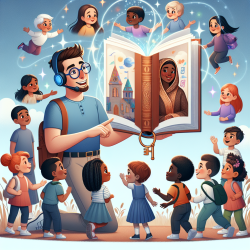Welcome to the TinyEYE blog! Today, we're diving into some exciting findings from the research article "Promoting Early Literacy Skills: Effects of In-Service Education for Early Childhood Educators." This study sheds light on how early childhood educators can enhance their storytime sessions to foster early literacy skills among preschoolers.
Interactive Book Reading: A Powerful Tool
Interactive book reading isn't just about flipping through pages. It's an engaging activity where educators encourage children to participate, provide feedback, and adapt their reading style to the children's linguistic and cognitive abilities. This method has shown significant benefits in developing children's expressive language and vocabulary.
Key Strategies for Educators
The study highlighted several strategies that educators can use to make storytime more effective:
- Story Comprehension: Move beyond basic picture descriptions and engage children with questions that integrate their background knowledge and encourage them to make judgments about the story.
- Narrative Structure: Focus on the key elements of stories, such as the setting, problem, characters' actions, and resolution. This helps children understand the internal organization of narratives.
- Print and Sound References: Make explicit references to print and sounds, such as pointing out the title, author, or specific words. This can heighten children's awareness of print and sound concepts, which are crucial for decoding text later on.
Implementing These Strategies
Here's how you can incorporate these strategies into your storytime sessions:
- Encourage Participation: Ask open-ended questions that prompt children to think about the story and relate it to their own experiences.Highlight Narrative Elements: Discuss the setting, characters, and key events in the story. Encourage children to predict what might happen next or how a character might feel.
- Make Print and Sound Connections: Point out interesting words, discuss their meanings, and highlight the sounds of letters and words.
Why It Matters
These strategies not only make storytime more engaging but also lay the foundation for essential literacy skills. Children who are exposed to these methods are better prepared for reading comprehension and narrative skills in later academic grades.
Continuous Learning
While the study showed significant improvements, it also noted that educators might need ongoing support to maintain these gains. Consider participating in booster sessions or collaborating with speech-language pathologists to keep your skills sharp and effective.
To read the original research paper, please follow this link: Promoting Early Literacy Skills: Effects of In-Service Education for Early Childhood Educators.










